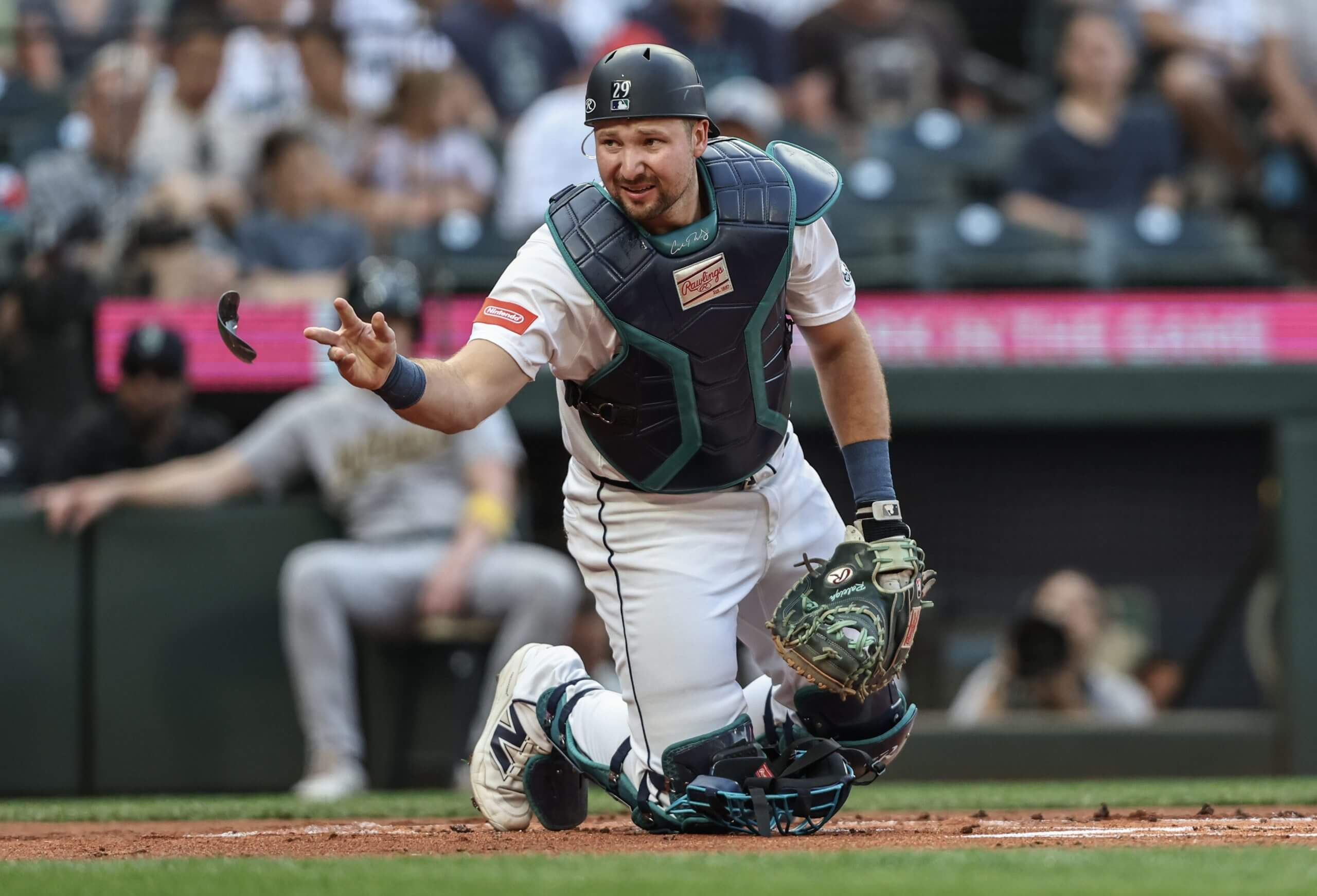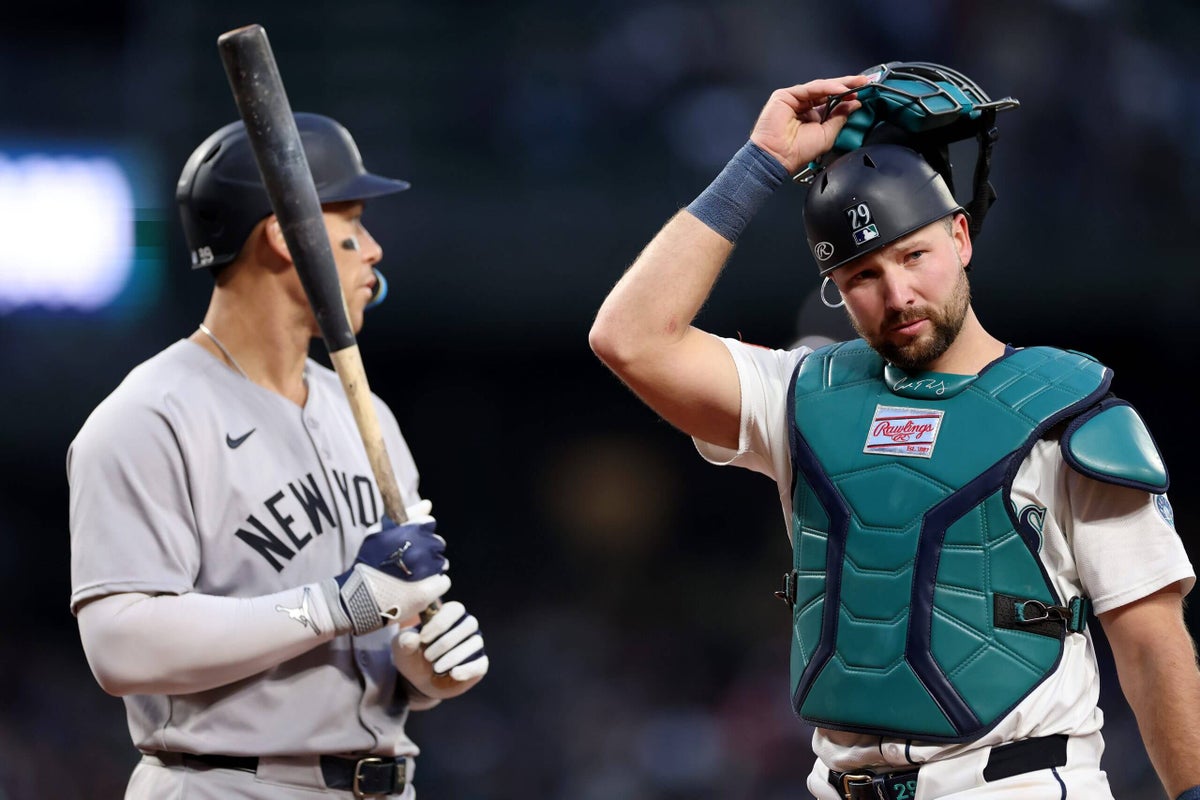By Tyler Kepner, Chandler Rome, Britt Ghiroli and Zack Meisel
Plenty has changed about baseball. Little has changed about how voters are supposed to determine the league’s Most Valuable Player. From the official guidance given by the BBWAA:
There is no clear-cut definition of what Most Valuable means. It is up to the individual voter to decide who was the Most Valuable Player in each league to his team. The MVP need not come from a division winner or other playoff qualifier.
The rules of the voting remain the same as they were written on the first ballot in 1931:
1. Actual value of a player to his team, that is, strength of offense and defense.
2. Number of games played.
3. General character, disposition, loyalty and effort.
4. Former winners are eligible.
5. Members of the committee may vote for more than one member of a team.
With that as a primer, here’s how The Athletic’s voters in the election for American League MVP, in which Aaron Judge earned 17 first-place votes and 355 points overall to prevail over Cal Raleigh (13 first-place votes).
History should be rewarded
Voter: Tyler Kepner
Past BBWAA elections: 1998 AL Cy Young, 1999 AL Cy Young
Why I voted for Cal Raleigh: It’s important to honor history when it happens. Raleigh’s 60 home runs set not one single-season record, but two — most home runs by a catcher and most by a switch-hitter. He did it across 705 plate appearances, a staggering total for a backstop.
Raleigh caught 121 games and logged 249 2/3 more innings in the field than Aaron Judge. That comes to 27 full games on defense at the sport’s most physically and mentally demanding position — an extra month’s worth of calling pitches, taking foul tips, controlling the running game, making plays at the plate and so on.
His first-half production was especially important, as in guiding a rotation battered by injuries and propping up a struggling lineup, Raleigh put Seattle in position to make the necessary late-July trades to fuel a run to the division title.

Raleigh’s historic offensive season came as he experienced the intense demands of being a full-time catcher. (Olivia Vanni / Getty Images)
I talked to a lot of people about this vote, and everyone recognized that Judge had an extraordinary season. But mostly, I kept hearing that Raleigh’s impact as a full-time catcher should outweigh Judge’s big edge in rate stats.
And it was a big edge: .331/.457/.688 for Judge and .247/.359/.589 for Raleigh.
Judge had a lot more singles than Raleigh and was the majors’ runaway leader in BABIP, at .376. Raleigh’s BABIP was .248. But for all of that, Judge amassed just one more extra-base hit than Raleigh, 85 to 84. Judge was worth 10.1 fWAR, Raleigh 9.1 fWAR. When the difference is that slim, it’s not enough to sway the argument.
There’s also precedent to consider. In 2022, Shohei Ohtani had 34 homers and an .875 OPS while also going 15-9 with a 2.33 ERA in 166 innings. Yet Judge won the MVP by doing something we’d never seen before: hit 62 home runs in the American League. History should be rewarded.
Not swayed by round numbers
Voter: Chandler Rome
Past BBWAA elections: 2018 AL MVP, 2023 AL Manager of the Year, 2024 AL Rookie of the Year
Why I voted for Aaron Judge: Media votes for it and fans will fret over it, but the MVP is a players’ award. Choosing one without involving them is crazy. So, throughout the season’s final month, I sought counsel from as many players as possible — inside and outside the clubhouse I cover.
Their rationales differed. What they valued — or defined as “most valuable” — did too. Some asked for extra time to think. Others ordered me to pull out my phone and look up specific statistics. After all of it, their answers were near unanimous, and it is reflected in my vote.
Then, in late October, Cal Raleigh won Player of the Year and American League Player of the Year in the Players Choice Awards. So much for a consensus.
In a way, it is fitting for this entire debate. There is no wrong answer, a sentiment shared by every player, coach or executive I peppered with questions before my vote. Raleigh had a remarkable, record-breaking season while playing the most rigorous position in the sport. Not rewarding that felt wrong.
So did not recognizing Judge for the best offensive season in the sport — one superior to Raleigh’s in every statistic but one. Yes, Raleigh hit seven more home runs than Judge and, maybe more important to some, reached a round number of 60. That he did so didn’t sway me. If Raleigh is the MVP with 60 home runs, he’s the MVP with 57, 58 or 59 home runs.
Raleigh reached 60, but still slugged 99 points lower than Judge. Raleigh reached base at a .359 clip — 98 points lower than Judge. Batting average may be antiquated in 2025, but Judge still beat Raleigh by 84 points. Judge eclipsed 200 in the two most popular park adjusted metrics — wRC+ and OPS+. Raleigh didn’t reach 170.
If a few of these gaps were closer, this is a different conversation. Judge is the first player in 21 years to finish a 162-game season with a batting average higher than .330, an on-base percentage higher than .450 and an OPS+ higher than 200. The last person to do it was Barry Bonds en route to the 2004 NL MVP. Jeff Bagwell did it in 1994, too, and also won the MVP.
One player I spoke with gave Judge an edge due to his stature in the sport. Another mentioned the market in which he plays and the burden of being the Yankees’ captain. Judge is the focus of every opponent’s scouting report and, within a three-game series, may see one or two hittable pitches. His slumps, however rare, are splashed all over tabloid pages.
That’s been Judge’s life for the past five seasons. Until the middle of this one, Raleigh never received such outsized attention.
No, Judge didn’t squat for 1,072 regular-season innings without allowing a passed ball, but did play 822 1/3 innings in right field with a 6-foot-7 frame. To act as if Judge contributed nothing defensively or had a pain-free season is disingenuous. Then again, so is comparing the rigors of playing right field to being an everyday catcher.
It’s why Raleigh would be a more than deserving MVP, even if he didn’t get my vote.
Simply superhuman
Voter: Zack Meisel
Past BBWAA elections: 2015 AL Cy Young, 2016 AL Cy Young, 2017 AL Cy Young, 2018 AL MVP, 2019 AL MVP, 2020 AL MVP, 2021 AL MVP, 2022 AL Cy Young, 2023 AL MVP, 2024 AL MVP
Why I voted for Aaron Judge: In mid-September, I approached a guy who once slugged a bunch of home runs as an everyday catcher. I never specifically asked Salvador Pérez about the AL MVP race, but over seven minutes, he volunteered three times his thoughts about Raleigh vs. Judge. The second sentence he uttered, referencing Raleigh, included: “I think he’s the MVP.”
Austin Hedges helped build Raleigh into a Platinum Glove winner. When I asked about the rigors a catcher encounters on a daily basis, Hedges shoehorned into his answer: “For me, he’s MVP.”
Hedges noted the physical toll Raleigh took from absorbing foul tips to his head, shoulders, knees and toes. He detailed the mental toll of calling 150-plus pitches per night. When A.J. Pierzynski joined the conversation, Hedges morphed into a used car salesman trying to convince a couple skeptics that the 2001 Pontiac Grand Am on his lot runs just fine now that it got an oil change.
The case for Raleigh is strong. I’d have no issue with him winning, as this was the most I’ve ever wrestled with one of these votes. (I’m sure that’ll comfort Mariners fans if Raleigh loses by one tally.) I’d consider the testimonials I heard from his catching peers, I’d marvel at his home run total, I’d ponder the magnitude of such a thrilling narrative — and then I’d go study Judge’s stats.
His .331/.457/.688 clip doesn’t look right on a laptop screen or a ballpark scoreboard. The only players in the last 25 seasons to record those numbers?
Aaron Judge, 2025
Barry Bonds, 2004
Barry Bonds, 2003
Barry Bonds, 2002
In fact, before Judge, only 11 players had ever done it; aside from Bonds and Manny Ramirez, they’re all Hall of Famers. There’s Judge fatigue, I get it. We’ve seen him do this before, and that compels us to search for reasons to shift our attention elsewhere. But he bested Raleigh in on-base and slugging percentage by 100 points each. His 204 wRC+ suggests he was more than twice as productive as the league-average hitter (and 43% more productive than Raleigh), and that takes into account their drastically different ballparks, from a hitter-friendliness standpoint.
I’m not sure what else Raleigh could have done. Judge is simply superhuman.
It’s the MVP, not best WAR
Voter: Britt Ghiroli
Past BBWAA elections: 2019 NL MVP, 2023 NL MVP, 2024 NL Cy Young
Why I voted for Cal Raleigh: This one was tough. All three of my colleagues above have already laid out terrific arguments for why Raleigh and Aaron Judge both deserve the MVP Award.
Like them, I deliberated. I read. I talked to many people in the game: executives, players and agents. The edge went to Raleigh. The simplest way to boil down how I feel about the MVP Award is this: it is, in its very essence, the player who possesses the most value to his team. It is not the best offensive player or the player with the best WAR. If it were, there wouldn’t even be a debate: Judge had a super season offensively and is in another league when it comes to what he can do with a bat and how much it can impact a team.
But this award, in my mind, encompasses so much more than that.
When I wrote in late September about the hours of preparation that went into Raleigh’s day, the starting pitchers’ meetings, the hitters’ meetings, the relievers’ meetings, the treatment of near-daily injuries to enable him to squat thousands of times a night, to make hundreds of decisions and get ready to bat not just from one side of the plate but two, I realized that stats — while wonderful — don’t accurately tell the entire story of Raleigh’s historic season.
There are plenty of numbers, as Tyler notes, that do strengthen his case. But advanced metrics still don’t accurately depict the wear and tear of catching, the art of framing and the way Raleigh, who went 1,072 regular-season innings without a passed ball, can impact a 13-man pitching staff nightly.
Again, Judge is the better offensive player and it’s not close. But Judge came to the field every day only worried about Aaron Judge, hitting only from the right side of the plate. Raleigh is part NFL coordinator, part player. He arrived at noon for 7 p.m. games for the first of a litany of meetings to prepare a starting pitcher and a bullpen. He got treatment to enable him to physically get into position for another nine innings. He prepared to hit lefty and righty. He took catching practice. He warmed up the starting pitcher. And then he got his first at-bat.
The numbers can make a case for Raleigh, but I don’t think they do enough. Value is subjective, it always has been. And subjectively, Raleigh meant more to the Mariners than Judge did to the Yankees.
